Interviews
Paula Mota: “I knew I was doing something illegal, but the health of our children surpasses everything”
Published
2 years agoem
By
Laura Ramos
At 49 years old, Paula Mota has already gone through a lot in the struggle to find a cure for her 13-year-old daughter Margarida, diagnosed with Refractory Epilepsy at the age of five. A lawyer and married to a police officer, Paula was far from imagining that the answer to relieving her daughter's crises lay in cannabis, something that, she confesses, forced her to do things considered “illegal”. However, Paula admits that to improve her daughter's health, she would be willing to do anything.
We visited Paula Mota in Porto, where she lives, to get to know her story better and understand how CBD (cannabidiol) has helped Margarida overcome some barriers inherent to her health condition. Paula guarantees that, after numerous attempts with different medications, only CBD managed to substantially improve her daughter's quality of life.
When did you realize that your daughter had refractory epilepsy?
Daisy had her first attack at 10 months and all the doctors thought it was a febrile crisis, so no medication was prescribed. From then on, she continued to have a normal life and growth. A year later, she had another crisis and at four and a half years she had a slightly longer crisis. As she was the third, they followed the established protocol, which is the introduction of the first medication. At that time, Margarida was a year without seizures, but at 5 and a half years, the seizures started to be much more frequent, daily, very prolonged. Many times we had to go to the emergency room, because the crises did not even give in to rescue medication. And then they started to introduce various medications, always taking some and introducing others, but she got to a point where she was taking eight anti-epileptic drugs in the morning and eight anti-epileptics at night.

Daisy had her first seizure at 10 months, but was only diagnosed with Refractory Epilepsy at 5 years of age.
How was Margarida doing at that time?
When she went to school at the age of six, we noticed that Margarida was not the same. She had had a major regression: cognitive, motor, with phases where she couldn't walk, caused by medication. There were phases when I wanted to speak and I couldn't, because I didn't have the strength, he drooled trying to talk and, when he went to school, he had the first difficulty, which was to start writing, because he didn't even have the strength in his arm. The seizures were so frequent, the medication was so much, and she was so prostrate that she didn't even have the strength to write.
And what did they decide to do?
We thought that was not our daughter and we wanted her back, the daughter who at four years old was a child with a growth and a cognitive level superior to her age. We had this Daisy, but she disappeared, not so much because of the seizures, but, we think, more because of the medication. So we went looking. Although we have already done many other therapies (acupuncture, reiki, auriculotherapy, aromatherapy, yoga, etc.), none of this worked. I found a Facebook group and saw that there were parents who were already using CBD oil for the treatment of epileptic seizures. I started to study, to read, to search in several sites. There was little in Portugal, there was more in the United States, on Israeli websites, and I started talking to parents who, outside the country, were already using CBD for epilepsy. Then, one day, I got the contact of a Spanish doctor. I made an appointment and the doctor advised us on CBD.
How was this medication readaptation process?
The doctor told me to speak with my daughter's pediatric neurologist to see if we could get some of the anti-epileptics that could interfere with the CBD treatment. I spoke to the doctor, who helped us, and said that we could slowly take some pills. And we started by taking out the ones that we thought would be causing the most cognitive delay. So we were introducing CBD and reducing anti-epileptic drugs. We began to see, right in the first phase, that Margarida began to have many improvements: motor, cognitive, and memory. AND we started to realize that, in fact, the CBD was having an effect and, in a first stage, to clean, let's say, the side effects. Then, as we were taking the anti-epileptics and introducing, very slowly, drop by drop, CBD, the seizures began to be more spaced and shorter in time. We even had 10-12 minute attacks and the attacks started to reduce to 4-5 minutes. Today Margarida is doing just two in the morning and two in the evening, with a dose of CBD, always trying to balance this dose and realizing if Margarida needs more or less.
Was Margarida's doctor, then, open to the possibility of CBD?
Yes. She informed us that she was not trained to help us with the dose issue or tell us which CBD we had to use, but she was always very attentive and was always helping us to wean us from medications, epileptics. And with it, we managed to get even more than we imagined.
 So CBD made the difference…
So CBD made the difference…
CBD made the difference, because we took away the anti-epileptics and all the associated side effects, which are much worse (CBD has no side effects) and we got Daisy back to being a little bit the Daisy that we had before the medication. At the moment, she goes to the 7th grade, she accompanies her classmates… she has difficulties, but she is perfectly capable of reading, writing, which was something we thought would not happen.
Did the doctors tell you this wasn't going to happen?
Doctors and teachers. The elementary school teacher said that she would never learn to read and today Margarida reads, does math and has the same subjects as her classmates, the same manuals, despite having adapted tests.
Didn't this happen before?
Not. Daisy could write her name today and tomorrow she wouldn't remember, she had to go back to the beginning. Not today. Today, she can take a test, can memorize, can read a text to the teacher and in the past she didn't do any of that. We realized that it was not the seizures, but the medication, that prevented her from having this cognitive development.
So do you think the side effects of medication can limit children who suffer from epilepsy?
Completely! The kids are completely drugged. She would often say: “Mom, I'm going to fall... My legs don't obey me and I'm shaking, do you want to see?” Today that doesn't happen. She had a lot of hand tremors and the CBD took them away. She walked and had no coordination or balance, even with physical therapy, we got to a point that it wasn't even worth doing physical therapy, because she was so drugged that she couldn't walk on a line. When we took the medication off and introduced CBD, the teachers, the doctor, the physical therapists all noticed a huge difference.
And in school? Does she feel she has support from peers? Or do they feel that she might be the target of some sort of bullying?
We had this problem in public school. Margarida attended a public school until the first period of the 3rd year and, then, we really had to take her out, because she started to have aggressive behaviors that she had never had. We consulted a behavioral psychologist who, after several sessions, told us that she was a victim of bullying in school. He didn't play with his friends, he didn't participate in activities, he spent breaks with the employees, because the public school does not have the capacity to have these children integrated. So we took Margarida out of school and put her in a private school. And from then on, for her, everything was different. She had other stimuli in learning and started to have friends, which she didn't have, she started playing in the playground, playing football, running... The kids are protective, if she has a crisis they know what to do. It is completely different from public school.
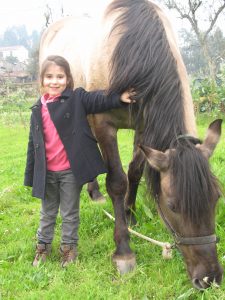 Paula, fortunately, has the possibility of paying for a private school, but there are many parents in this country who don't… How do you think these people do?
Paula, fortunately, has the possibility of paying for a private school, but there are many parents in this country who don't… How do you think these people do?
I have testimonials from mothers whose schools don't even accept kids. These mothers suffer, because these kids have every right to be in a public school, integrated into a normal classroom. The State has an obligation to provide these children with integration, of being together with others and not isolated, because what exists in relation to these epileptic children is segregation. The teachers themselves, no matter how good they are…the system doesn't allow them, they don't have available staff or training. If they have a crisis, they don't know what to do.
And what is the alternative for these children?
The alternative is to join them in a room with other children with profound disabilities. And we have epileptic children who don't have any disabilities, who have cognitive abilities just like any other child and who just need to be stimulated. There shouldn't be these separate rooms for children who have certain types of disabilities, that's not inclusion.
At Margarida's school, do her classmates and teachers know that she takes CBD?
Colleagues know that she takes medication. Teachers know she does CBD, yes. The law has existed since 2018 and, from then on, the teachers and the school know that Margarida makes the CBD. By the way, the school has a nurse and she has a sheet with all this information, yes.
Was there any special curiosity about CBD? Did it spark any conversation?
Some teachers, yes, asked, because there are people who have pathologies and also want to know what is best for them, right? I've already had some conversations with some teachers explaining why Margarida did the CBD, what were the differences, even because I need the teachers to give me feedback on Margarida's reactions, if she is more awake, to know if it was because I removed this and increased that.
Did Margarida stop having seizures?
The crises haven't stopped yet (we don't have miracles either), but the difference between crises before CBD and now is brutal. In fact, the difference in all of Margarida is brutal, there is no comparison. Only those who knew Margarida in these three phases (up to 5, from 5 to 8 and from 8 to now to 13) is that you can understand the differences that CBD has brought you.
 So you've been giving him CBD for five years, since when it was still illegal.
So you've been giving him CBD for five years, since when it was still illegal.
I introduced CBD in 2017 and of course it wasn't cool. As of 2018, the year the law was passed, then yes, I could talk about it more freely. We are talking about a plant! When I talk about a drug that my daughter took, It hurts me more to talk about a benzodiazepine than it hurts me to talk about CBD. The benzodiazepine takes away Daisy's motor skills. CBD gives it to you. From then on, it was all a difference… and never introducing anti-epileptic drugs again. We will always be looking for the best plant, always looking for the best CBD and, therefore, this is the path that we will continue to follow.
What was it like dealing with the feeling of being outside the law?
It was complicated, because I knew I was doing something illegal. I was always buying through the internet, always hidden. There was no alternative. I tried to send it from the United States, it got in customs and I was perfectly aware that I was doing something illegal. Now, when we weigh illegality or our children's health in the balance, our children's health trumps everything, so illegality was left behind.
Did you consult the legislation or not?
I went, I went… If I got caught, what could happen to me? Running out of CBD? Okay, what I had to do was buy again. If it wasn't on that site, it would be on another one, because I was experimenting too. As this is a plant, Margarida, after a while, gets used to it, so after a few months we need to change brands. But I pondered, I asked myself many times: “If I go… someone will defend me!” (laughs) Obviously, it is difficult for us, on a professional level, to admit that we are committing an illegal act, for those who work with the law, it is complicated. Now, our children's health trumps all of that, and I was willing to take all the risks, go without CBD, have to be identified at the precinct or have to go before a judge. It was all worth it.

Daisy is currently 13 years old.
And your husband, as a policeman, had more reservations?
My husband was a little apart from this situation, because I am a liberal professional, but the police is an institution, with some even strict rules in the behavioral aspect of the agents. And so he didn't even know. I bought it, came on my behalf to an address other than ours and, if something happened, I would have to show up, not him. That way he would always be protected.
Do your husband's colleagues have any idea of this?
Colleagues now know, because one of them, whose wife had an oncological problem, did too. They never talked to each other about this subject, because it was illegal, because my husband didn't know and his colleague never talked about it either. Now they know perfectly well, in fact, I went to television and they know what Margarida uses and the difficulty we have in buying. But he never felt that his colleagues would blame him for it.
Have you had requests for help from other mothers?
I have a lot of requests. Every day I receive requests for help from mothers who need guidance, who feel that maybe there is an alternative there and that they can't get there, because they don't have the information, because there are no doctors in Portugal... doctor and people I know who can refer them, so that they can also be helped. Always warning that the treatment is expensive.
How much is Daisy's treatment per month?
At the moment it is around 350 euros per month.
Not everyone can…
No, not everyone can! Adding a school to this, the treatment, apart from the therapies that Margarida has, private… no, it's not for everyone, it's a huge sacrifice that we make. We deprived ourselves of many things to be able to give this quality of life to our daughter. Of course we have the help of the family, but we have deprived ourselves of many things that we could do and have, but we don't. We have our daughter with quality of life, which is what matters to us. Now, I understand the despair of these parents and, when they ask me for help, what costs me the most is when people ask me the monthly cost of this, because for those who have one child it is difficult, for those who have two or three it is unthinkable. Most people earn the minimum wage and the State does not pay anything, not even the alternative therapies that we may need. It's hard to know that there is an alternative and that very few parents can afford it. Knowing that the parents do not even have the financial capacity to pay for this treatment, it costs. That's what hurts me the most!
__________________________________________________________________
Interview originally published in #3 of Cannadouro Magazine
____________________________________________________________________________________________________
[Disclaimer: Please note that this text was originally written in Portuguese and is translated into English and other languages using an automatic translator. Some words may differ from the original and typos or errors may occur in other languages.]____________________________________________________________________________________________________

What do you do with €3 a month? Become one of our Patrons! If you believe that independent cannabis journalism is necessary, subscribe to one of the levels of our Patreon account and you will have access to unique gifts and exclusive content. If there are many of us, we can make a difference with little!
Related News
-
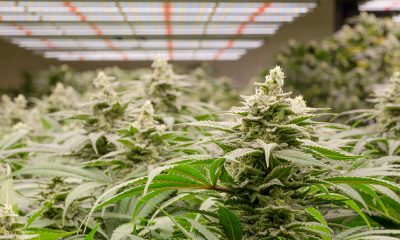

The impact of light quality and intensity on LED cannabis production
-
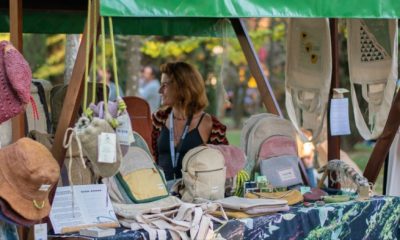

From dream to nightmare: Marta experiences the difficulties of the hemp sector in Portugal
-


Jay-Z is the latest celebrity to jump into the cannabis business
-
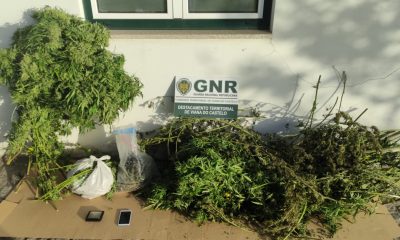

Caminha – Two arrested for growing 5 cannabis plants
-
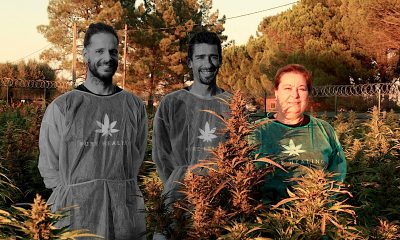

Sérgio Neto and Ricardo Morais, founders of Pure Healing, left the company
-
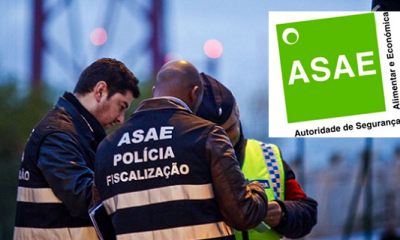

Portugal: ASAE seized more than 4 million products and insists on CBD as a “novel food”, despite the Court deeming it “non-narcotic”

Mais recentes


4:20 is coming and there are celebrations in Porto and Lisbon
The date for celebrating cannabis culture is approaching! This Saturday, April 20th, is the day when...


Paul Bergholts, alleged leader of Juicy Fields, detained in the Dominican Republic
Paul Bergholts, the alleged leader of the Juicy Fields pyramid scheme, has been detained in the Dominican Republic and will be subjected to...


Cannabinoids reveal promising results in the treatment of Borderline Personality Disorder
An investigation carried out by Khiron LifeSciences and coordinated by Guillermo Moreno Sanz suggests that medicines based on...


Juicy Fields case: 9 detained by Europol and Eurojustice. Scam exceeds 645 million euros
A joint investigation conducted by several European authorities, supported by Europol and Eurojust, culminated in the arrest of nine suspects...


Regular cannabis users may require more anesthesia during medical procedures
Regular cannabis users may require more anesthesia during medical procedures to remain sedated compared to...
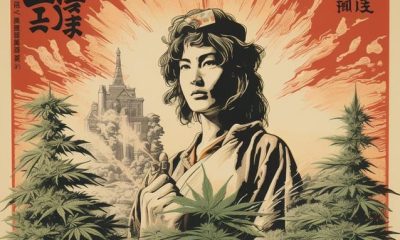

The future of CBD in Japan: How legal reforms will shape the market
Late last year, Japan took a big step towards cannabis reform after approving...


Portugal: GreenBe Pharma obtains EuGMP certification at Elvas facilities
GreenBe Pharma, a medical cannabis company located in Elvas, Portugal, has obtained EU-GMP certification under...
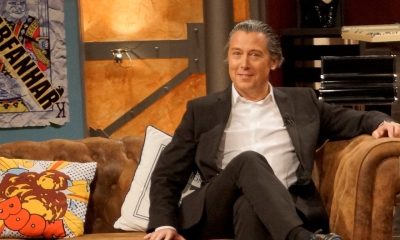

Álvaro Covões, from Everything is New, buys Clever Leaves facilities in Alentejo for 1.4 million euros
Álvaro Covões, founder and CEO of the show promotion agency 'Everything is New', which organizes one of the biggest festivals in...
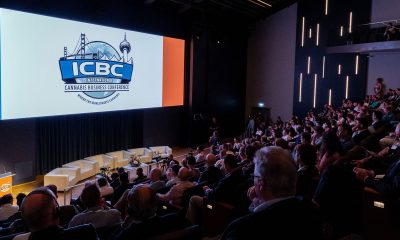

ICBC returns to Berlin on April 16th and 17th
It is one of the largest and most recognized B2B cannabis conferences in Europe and returns to Berlin in...
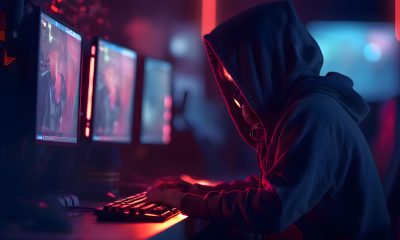

The legalization of cannabis in Germany seen through the eyes of the hacker who created an essential map
A hacker from Koblenz, a city in the state of Rhineland-Palatinate, created a map with the places where, from...







